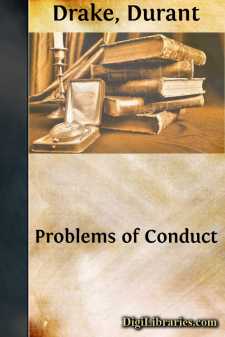Categories
- Antiques & Collectibles 13
- Architecture 36
- Art 48
- Bibles 22
- Biography & Autobiography 813
- Body, Mind & Spirit 142
- Business & Economics 28
- Children's Books 17
- Children's Fiction 14
- Computers 4
- Cooking 94
- Crafts & Hobbies 4
- Drama 346
- Education 46
- Family & Relationships 57
- Fiction 11829
- Games 19
- Gardening 17
- Health & Fitness 34
- History 1377
- House & Home 1
- Humor 147
- Juvenile Fiction 1873
- Juvenile Nonfiction 202
- Language Arts & Disciplines 88
- Law 16
- Literary Collections 686
- Literary Criticism 179
- Mathematics 13
- Medical 41
- Music 40
- Nature 179
- Non-Classifiable 1768
- Performing Arts 7
- Periodicals 1453
- Philosophy 64
- Photography 2
- Poetry 896
- Political Science 203
- Psychology 42
- Reference 154
- Religion 513
- Science 126
- Self-Help 84
- Social Science 81
- Sports & Recreation 34
- Study Aids 3
- Technology & Engineering 59
- Transportation 23
- Travel 463
- True Crime 29
Problems of Conduct
by: Durant Drake
Description:
Excerpt
PREFACE
This book represents in substance a course of lectures and discussions given first at the University of Illinois and later at Wesleyan University. It was written to meet the needs both of the college student who has the added guidance of an instructor, and of the generalreader who has no such assistance. The attempt has been made to keep the presentation simple and clear enough to need no interpreter, and by the list of readings appended to each chapter, to make a self directed further study of any point easy and alluring. These references are for the most part to books in English, easily accessible, and both intelligible and interesting to the ordinary untrained reader or undergraduate. Some articles from the popular reviews have been included, which, if not always authoritative, are interesting and suggestive.
The function of the instructor who should use this as a textbook would consist, first, in making sure that the text was thoroughly read and understood; secondly, in raising doubts, suggesting opposing views, conducting a discussion with the object of making the student think for himself; and, thirdly, in adding new material and illustration and directing the outside readings which should supplement this purposely brief and summary treatment. The books to which reference is made in the lists of readings, and other books approved by the instructor, should be kept upon reserved shelves for the constant use of the class in the further study of questions suggested by the text or raised in the classroom.
It will be noticed that the disputes and the technical language of theorists have been throughout so far as possible avoided. The discussion of historical theories and isms' is unnecessarily bewildering to the beginner; and the aim has been rather to keep as close as possible to the actual experience of the student and the language of everyday life. Far more attention is given than in most books on ethics to concrete contemporary problems. After all, an insight into the fallacies of the reasoning of the various ethical schools, an ability to know what they are talking about and glibly refute them, is of less importance than an acquaintance with, and a firm, intelligent attitude toward, the vital moral problems and movements of the day. I have prayed to be saved from academic abstractness and remoteness, and to go as straight as I could to the real perplexities from which men suffer in deciding upon their conduct. The purpose of a study of ethics is, primarily, to get light for the guidance of life. And so, while referring to authors who differ from the views here expressed, I have sought to impart a definite conception of relative values, to offer a thread for guidance through the labyrinth of moral problems, and to effect a heightened realization of the importance and the possibilities of right living.
It is necessary, indeed, in order to justify and clarify our concrete moral judgments, that we should reach clear and firmly grounded conclusions upon the underlying abstract questions....


